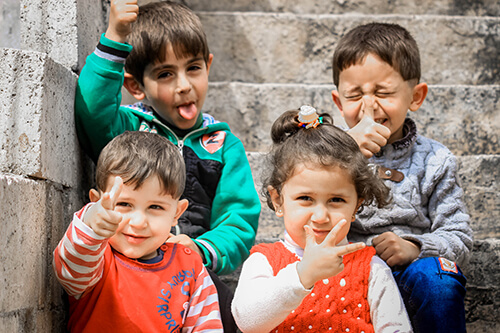The word "SIBLING" refers to brothers and sisters and siblings playing a significant role in each others’ development.
"Siblings are, for better and for worse, each other’s ultimate fellow travelers. Whether their bonds are comfortable or uncomfortable, or a little of both, they are co-voyagers in a world without many enduring reference points" (Bank & Kahn, 1997, p. xvii).
Relationships between brothers and sisters have often been called life’s most influential and longest-lasting relationships-lasting longer than ties to parents, spouses, or children (Bank & Kahn, 1997).
The term "Sibling Rivalry" refers to the feeling of competitiveness amongst siblings-and this may show up as resentment, fighting, “being bossy”, “becoming aggressive”, sulking, becoming shy or introverted and in many other ways. It is not unnatural for most siblings to go through these feelings- and they swing between a love-hate relationship almost on a day-to-day basis.
In a research study conducted amongst parents with 2 or more children, it was found that
- 30% of the children went through love-hate relationships
- 25% were mean to each other (sometimes very mean!)
- 7% were each other’s worst enemies
- Only 30% were the best of friends!
Who gets what? Who does what? Who goes first? Who gets the most? Who’s right? Who’s better? Fighting for who sits in the front seat of the car, or which show they can watch together on TV, or whose bedtime story mummy reads out first –the list is endless and may seem very commonplace to parents. However, for the siblings, there are always reasons-some basic and some deep-seated. And it is for the parents to understand these reasons and resolve the conflict before it leaves a deep-seated impact on the impressionable minds of the children and plays out in undesirable behavioral patterns at a later stage(there are instances of some children resorting to unacceptable means of attracting attention from parents just because they felt that their sibling got more attention and parents didn’t have time for him).
Sibling Rivalry sets in before a new child joins a family that already has one or more children. And with the actual arrival of the younger child, the family begins to experience a “little” person with his or her temperament, likes and dislikes. And while the family grapples with adjusting to this situation, it is the older child who has the maximum amount of trouble relating to and appreciating all the fuss around the baby.
Parents will agree that it is very frustrating to see/hear your children fight. Most of the time parents cannot even understand the reason for the fight and try various methods to resolve the conflict-given situation at hand. Very often the solutions arrived at to resolve ongoing sibling conflict may result in stress between couples (as one may believe that the other is being too harsh in resolving the conflict or may disagree with the solutions arrived at or some such thing) Let’s try to understand why siblings fight and how parents can help kids to get along better and let peace prevail around the house.
Handling Early Sibling Rivalry-During Pregnancy (before the birth of a new baby)
“What’s all the fuss about?” Probably your child’s first thoughts when he sees the family preparing for the arrival of the newborn. And the moment he learns that a smaller baby is due to arrive (and he will no longer be the “baby of the house”) his mind begins to run wild. And his first thoughts are most likely to be that he will be abandoned and the new baby will take his place.
Parents need to provide a lot of reassurance to their children that it is not so. And in this case, actions speak louder than words of reassurance. The things you can do are-
- Revisit-the baby days of your older child and make her feel special. Talk about everything that happened from the time that you were expecting her. Let her see the likeness to the current situation. Talk about her toys, her sleeping, how she took her first step, and how you as the elder helped her all along. Show her the baby book that you may have made from her first day. All this will help her understand that she got the same treatment when she was a baby and also help her prepare herself to accept a new baby in the house. And help her understand the kinds of activities she will see happening in the house.
- Reinforce- Help your child reinforce confidence in her world-which is her family and her friends. With the baby’s help, build a scrapbook containing pictures of your home, your pets, yourself, the baby’s friends and her school, etc. Add photos of any vacations that you may have taken and other happy moments spent together. Make sure that there are a lot of pictures of you and her together. This will boost her confidence and give her an anchor to hold on to while you are away for your delivery. Children like familiar things-the scrapbook will give her many familiar memories in one place.
- Remember-In this period the child will notice a lot of new activities happening around the house. Make sure that none of the activities that earlier involved your child and you are discontinued. This will help the child feel secure. Continue your meals at the table, reading stories before bedtime and other such activities as much as you can.
- Refrain-Your baby may not be ready to “grow up” just because another one is on his way. She still loves her crib, her soft toys, her little blanket, and a little soft pillow. Don’t take away the baby’s things for the new arrival. You will have to give your older child her “special things” and only then can you use her baby stuff for the new arrival. For instance, you may get your older child her bed and decorate it to make it special for her. Once she begins to think of it as her own, you can then use her baby crib for your new arrival.
Handling Early Sibling Rivalry-Once the baby is home from the hospital
- Involve your older child in bringing up baby-Ask your child to be at your side while feeding, bathing, changing the baby. Or even when you take the baby for a stroll. Let him help you with small chores such as fetching stuff, handing you things, pushing the stroller, or even humming a nursery rhyme to calm a crying baby. Make him feel that you couldn’t have done it well enough without his help. This will make your child feel that he is a part of the upbringing and feel responsible towards the baby instead of resenting him.
- Make time-Taking care of a small baby will certainly take away a lot of your time. Remember to slot exclusive time for your older child ideally in doing an activity that he enjoys. And set up a fixed time in the day when you will do the activity with him (when your baby is a few weeks old, his sleeping will fall into a pattern and you will know when you are free to schedule activities with the older child)
- “No one talks about me any longer”-Your child is quite likely to feel this (even though they may not be able to articulate it). This is especially pronounced when people are visiting-and gushing over the new baby-giving his gifts and all their attention. In such a situation the older child is very likely to feel left out and develop negative feelings towards the newborn. Please tell your visitors about the feelings your older child is having and request them to pay attention to your older child as well. Everyone has families-and will readily understand and respond.
- Familiarity leads to a feeling of safety- After the birth of a new baby, your older child may misbehave deliberately or show a lack of discipline which may come as a surprise to you. This is a way for children to test the limits of what they can and cannot do (especially now that mummy has someone else to care for). Show your older child you care. And there’s no better way of doing this than keeping the rules consistent with what they were before the newborn came along. Your child will understand that things haven’t changed-will feel cared for and safe and fall back in line.
The sibling rivalry between toddlers
Toddlers and preschoolers display regressive behavior as a sign of sibling rivalry. What this means is that they may start behaving as they did when they were younger. Some may start wetting their pants again, and some may return to thumb sucking. This behavior does not last more than a few weeks when they realize that their parents are not going to abandon them. Once this realization settles in they get back on the track of their development cycle.
A few tips while handling toddlers-
- Don’t compare-Each child is different. And has his talents. Focus on your children’s talents and avoid comparisons. This will help children learn to look for positive traits in themselves instead of feeling inferior to their siblings. And don’t forget to compliment your child in their activities
- Don’t ever say things like –“I wish you were more like your brother”. This is sure to get children feeling terrible about themselves.
- Give time to both children and pay attention to their activities. It’s difficult, but then who said parenting was easy? Identify their strengths in the activities they like and compliment them – it’s reassuring for children to see that the parents are paying attention to their day-to-day stuff.
Older Siblings- Finding solutions amongst siblings of all ages
A lot of what we have said earlier holds for older siblings as well. Also, you may like to keep the following points in mind-
- Parenting Styles-Discuss the important issues with your partner so that conflict arising out of different parenting styles is not visible to children. Children are likely to use this conflict to get what they want especially if different parents are supporting different siblings on a specific issue
- Do not in any way stress competition among siblings. Children interpret this as “being loved is conditional” and develop negative feelings towards their sibling.
- Rules will save the day for you-Set the rules for important activities-from the mundane activities such as “everyone must eat at the table together” to special ones like “amount of money to be spent on a birthday party”. Rules help children understand that they are equal for their parents and foster bonding amongst siblings.
Click here for Case Study on SIBLINGS
Top Questions on Siblings
- I have just had a second baby and my firstborn is extremely jealous of her. She tries her best to attract my attention and complains I love my newborn baby more than her.
- I have a five-year-old and a 3-month-old baby. My older child has suddenly become disobedient, she occasionally soils her clothes even though she is fully potty trained. I feel she is jealous of the newborn. What can I do to ease the situation?
- Nursing the newborn and being able to find time for my older child are becoming impossible. How do I manage this?
- My son who is three gets really mad every time I ask him to be quiet around the house. He makes sure that he creates a huge noise especially when the baby is sleeping. What should I do?
- My daughter aged 4 ½ completely ignores the baby as if he just doesn’t exist. She behaves as if there is no change or addition to the family and expects all of us to do the same. Help!
- My children fight, and then come to me trying to prove that each one is right. How can I help them find a solution on their own?
- Both my children get aggressive and fight with each other. Should I take sides with the one who is right, and reprimand the one who is wrong?
- My child has too many fights with his/her sibling. What can I do?








